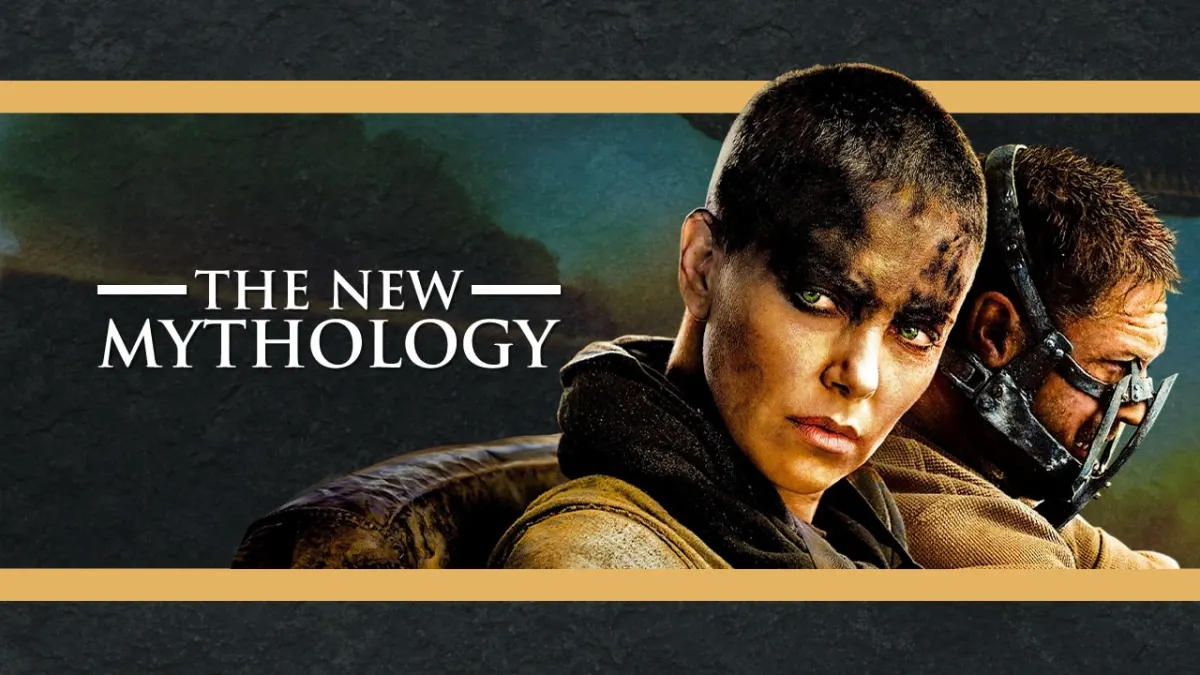Critics and fans regularly hail Mad Max: Fury Road as the greatest action movie of all time. Yet almost no one mentions how director George Miller’s openly acknowledged debts to Homeric myth explain why Fury Road is so excellent. Fury Road is so beloved because it unpretentiously adapts the storytelling structure, themes, and characters of the Iliad and Odyssey.
George Miller was raised on DC Comics in a rural, isolated community with immigrant parents trying to reproduce their Greek way of life in Australia. Miller was influenced by Greek myth and Greek storytelling traditions and to this day finds the Odyssey his favorite myth. Miller’s desire to adapt Homeric myth for modern audiences suggests why Fury Road was designed as an “epic visual poem.”
Fury Road, like every Mad Max movie after the first, is framed as “a Legend of the Road Warrior” wastelanders share with us in the present. The professional storytellers of the wasteland, the Homeric bards, are called “History Men and Women” who tell “Word Burgers.” In the post-apocalyptic universe of Mad Max, it’s probably been a long time since anyone saw a burger. The History Men likely recall the nourishment of burgers, and so “Word Burgers” comes to mean something like a myth or legend, literally implying a Word Burger is food for one’s soul.
The Iliad and Odyssey were Word Burgers for the ancient Greeks. Homer was Greece’s History Man. Homer’s Word Burgers were the Greeks’ most popular myths. The Iliad is about war and how Achilles’ ruinous rage causes him to reject the warrior code. The Odyssey is about homecoming after the Trojan War and Odysseus’ harrowing experience in particular.

Just like the Mad Max movies result from the oral tradition of the wasteland, both the Iliad and the Odyssey were the results of an oral tradition, a collection of legends about long-suffering heroes. Miller and Homer’s myths command the awe of multiple generations, not just because they are excellent action stories, but also because their characters confront timeless problems.
Like the Iliad, Fury Road is about war and the empty promise of killing for immortal glory.
The desire for immortal glory is the concern of every War Boy in Fury Road like Nux and every Homeric Hero in the Iliad like Achilles. In both myths death is inescapable, so why not die for something great; why not acquire enough glory to be remembered forever? Nux and Achilles are memorable heroes because of how they reject the warrior code of their societies and choose to fight for their personal relationships, even though it guarantees their death.
Nux’s fundamental desire is to be remembered as the greatest warrior of all time. Nux is already a great warrior, having earned the rank to command a lancer (Slit), the right to endanger a universal blood donor for his medical care (Max), and the honor of driving the fastest vehicle in Immortan Joe’s armada. To achieve immortal glory, Nux just needs to “die historic on the Fury Road” before his worsening night fevers kill him. In the face of imminent death, Nux wants his life to matter. Nux finds meaning in war.
But events disabuse Nux of his belief in the warrior code. Nux shamefully fails to kill Furiosa multiple times and unhappily discovers that the promise of immortal glory is a lie told by Immortan Joe, who is no God, but merely a warmongering charlatan. But through his budding relationship with Capable and the wives, Nux discovers a new purpose for his life. Nux takes up arms again, not for immortal glory, but for a relationship worth fighting for.

Nux’s character arc in Fury Road mirrors Achilles’ arc in the Iliad.
At the start of the Iliad, Achilles is already acknowledged as the greatest living warrior: a veritable one man army. Prophecy tells him he can live a long but forgettable life at home or fight at Troy, die young, and be remembered forever. Achilles chooses war and immortal glory.
But events disabuse Achilles of his belief in the warrior code. He is publicly punished and shamed by Agamemnon for his concern for the entire Greek force at Troy. No one stands up for him when he stands up for everyone. In response, Achilles loses interest in being remembered for all time by these assholes, deciding to sit out the war. Agamemnon’s allies try to change his mind, reminding him of the warrior code. Achilles is promised great gifts and immortal glory if he fights. Everyone is shocked by his stark refusal: “Nothing is worth my life, not all the riches […] You can always get tripods and chestnut horses. But a man’s life cannot be won back.” Achilles rejects the warrior code that defines his entire culture, preparing to return home to a long and “forgettable” life with friends and family.
When Achilles does fatefully take up arms against the Trojans, it is for personal reasons alone. Achilles seeks to avenge the killing of his lover Patroclus at the hands of Hector. He fights for revenge, not glory.
Achilles’ transformation from a kami-crazy War Boy is even more obvious in the Odyssey. Achilles’ ghost rebuffs Odysseus’ claim he should be happy for the privileged position he earned in the underworld by fighting shiny and chrome, witnessed by all: “Odysseus: don’t try to reconcile me to my dying. I’d rather serve as another man’s laborer, as a poor peasant without land, and be alive on Earth, than be lord of all the lifeless dead.”
Nux and Achilles’ character arcs mirror each other. They both reject the warrior code that defined their culture and entire way of life before spectacularly re-entering the fray on their own terms. Both choose to die in battle for the sake of their loved ones. In doing so, they earned lasting glory, but not for their skill at butchering other humans. We remember them for the relationships they fought for.
Like the Odyssey, Fury Road is about the difficulty of homecoming after war.

Max and Odysseus are traumatized killers hoping to find their ways home; paranoid survivalists scarred by war and their own actions. They share the same problem; they want to get home, but they don’t want to trust anyone else and are unwilling or unable to confront their grief and loss.
Fury Road starts with Max losing what little he has left of home — his V8 Interceptor. He is a raging feral, muzzled, and reduced to one instinct: survival. Max speaks in monosyllabic grunts, shunning the company of others. He appears to suffer from PTSD. He is the one “who runs from the living and the dead. Hunted by scavengers. Haunted by those I could not protect.” Max responds to loss by wandering so he can avoid relationships; he can avoid extra misery and grief. He will not or cannot grieve. But merely wandering and surviving alone, Max is a mute, insane, and traumatized animal. All Max wants to do is go home. But he doesn’t have one anymore.
Max’s arc is the partial rediscovery of trust, home, and his lost humanity. He struggles with a repressed desire to help others in a wasteland that exploits such vulnerability. Max starts as a paranoid loner and an unwilling blood bag who refuses to tell Furiosa his name. By the end of the movie, Max is terrified of Furiosa dying, voluntarily gives her a blood transfusion, and shares his name with her. Max finds a new, if temporary, home in his relationship with Furiosa and the wives. Ultimately, Max is still too traumatized to permanently home with others, and his wanderings begin anew. Max may be too far gone for redemption.
Max’s character arc in Fury Road mirrors Odysseus’ arc in the Odyssey.

The Odyssey makes clear that before the Trojan War, Odysseus was a just king, capable leader, and kind father. But we learn that the war and his own despicable actions undid Odysseus. Pre-war he was nearly a pacifist. Post-war he needlessly butchers over 100 men in his home. As Athena gleefully notes upon his return to Ithaca, his first instinct is always to lie and prepare for conflict. The need to survive has ruined his capacity to trust. Only by trusting others and temporarily overcoming his instinctual need to lie and kill does Odysseus return home. Odysseus appears to suffer from PTSD; his character arc is one of a tortured warrior’s homecoming.
Odysseus is a traumatized killer. He loses hope and considers suicide multiple times. Odysseus is haunted by his failure to protect others. He took 600 men with him to Troy — he came back with none. Odysseus is a survivor. His homecoming takes seven thousand plus days, 20 years, but nothing can kill him, not wars, monsters, demigods, or gods. After experiencing and participating in the atrocities of war, all Odysseus wants is to return home. Even then, prophecy states he must wander even farther to truly finish his homecoming. Ultimately, Odysseus’ homecoming allows him to recover some of his lost humanity, but he still has a long way to go.
Max and Odysseus struggle with the same issues. Only by trusting others can either come home. We remember them, not because we want to become traumatized, but because we all need to find home somewhere. We all need to deal with suffering, loss, and death eventually — surviving, wandering, it isn’t enough.
Fury Road skillfully repurposes the character arcs of the protagonists in the Iliad and the Odyssey, reimagining the struggles of Achilles and Odysseus. Nux is to Achilles as Odysseus is to Max. But Miller is no slave to Homer. Miller’s homecoming story ends in a true triumph. Max and Odysseus may remain restless wanderers, but Furiosa can come home for good. Furiosa is also a traumatized survivalist and killer. But she’s more willing to trust others, able to confront her loss, and motivated to help others on their homecoming journeys.

Furiosa spent her life at war: serving a tyrant, killing her way to the top, dehumanizing herself to survive. She’s been trying to get home for “seven thousand days plus the ones I don’t remember.” That’s nearly 20 years. She’s only a few steps away from becoming hopeless and haunted like Max or Odysseus. But even when she loses hope, she doesn’t push others away.
Even when she learns her home is gone, Furiosa still chooses to welcome others in. She invites Max to permanently join her and her allies, provoking Max’s better self to re-emerge. Her hospitality enables both of their homecomings. Max’s visions (of “The Accusing Dead” he promised to help and failed to protect) command him to aid Furiosa. Max suggests they reignite the Road War and retake Furiosa’s old home, the Citadel. Together, they come across some redemption. Furiosa returns home after a life at war. Homecoming is possible.
We can learn from the myths of Nux, Achilles, Odysseus, Max, and Furiosa. This is why George Miller loves to invoke Joseph Campbell’s dictum that we retell myths because they, like religion, help us find meaning in the universe. We use stories for survival — they separate the signal from noise; they map out our world. Stories teach us how to live; myths orient our lives.
Fury Road is a Homeric Epic, a timeless allegory, a post-apocalyptic spin on the myths of Achilles and Odysseus. Fury Road unpretentiously transmits and reinvents the legacy of Homer. Like the Iliad and the Odyssey, Fury Road reveals that our lives can still be meaningful even if we are overwhelmed with trauma, suffering, and death. Hope is not a mistake. Redemption is always possible. Relationships are the only thing worth surviving and fighting for.





Published: Jul 11, 2020 01:20 pm